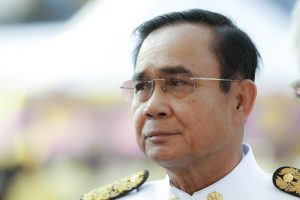Thailand’s Constitutional Court says that it will rule on September 30 on the future of the country’s suspended Prime Minister Prayut Chan-o-cha, who has been accused of exceeding the constitutional limit of eight years in office.
Last month, the court suspended the Thai leader from office while it examines a petition filed by the opposition Pheu Thai Party (PTP), which argues he should have left office last month.
The petition, signed by 171 opposition parliamentarians, argued that Prayut’s term in office commenced on August 24, 2014, three months after he led a coup against the country’s democratically elected government. As a result, the petition argues that Prayut should have stepped down on August 23.
Prayut’s supporters contend that his time as prime minister should be counted from April 6, 2017, the date the current constitution was adopted. Some argue that the countdown began on June 9, 2019, when he took office following that year’s election.
The petition is just the opposition’s latest bid to remove Prayut from office. It has called four no-confidence votes against him since the 2019 election, the most recent of which occurred in July, and has faced down – and, through legal blunt force, largely defeated – a campaign of youth-led protests pushing for his resignation and deeper reforms to Thailand’s lopsided political economy.
These no-confidence votes have been intended less to succeed – the PTP simply doesn’t have the votes – than highlight the illegitimate nature of Prayut’s rule. Namely, that after ruling for nearly five years as head of a military junta, the former general helped pass a new constitution and election laws that vastly advantaged parties representing Thailand’s military establishment. PTP lawmakers also accuse the Thai leader of mismanaging the economy and the country’s response to the COVID-19 pandemic.
The petition on Prayut’s term in office is a gambit that stands a decent chance of success. The Constitution is fairly clear in its intention that all candidates be limited to eight years in office, regardless of when those years were served – a failsafe against any return of exiled former Prime Minister Thaksin Shinawatra, whose popularity was loathed and feared by the conservative-royal establishment.
Should the Constitutional Court vote to remove Prayut from office, however, it is doubtful whether it would make much difference to the dominant political power. Far from being the linchpin of the system, such as Prime Minister Hun Sen in neighboring Cambodia, Prayut is merely its face. As such, he is effectively disposable, and his removal from office would do little to undermine the hold
As Mark S. Cogan wrote in these pages last month, the Constitutional Court’s eventual verdict “isn’t likely to send shockwaves through Thailand’s political system.” The court has a long history of rulings in favor of the country’s conservative establishment, and while it may be willing to dismiss Prayut from office, it won’t dismantle the structure of power that he represents.
Indeed, such is Prayut’s unpopularity that his dismissal might well strengthen the position of the country’s military-royal elite. A survey conducted last month by the National Institute of Development Administration showed that nearly two-thirds of respondents wanted Prayut to leave office.
If instructed to stand down, Prayut is likely to be succeeded by Deputy Prime Minister Prawit Wongsuwan, who is currently serving as acting prime minister. As The Associated Press observes, “he and Prayut are both former army commanders and comrades in arms for decades backed by a political party set up as a proxy for military interests.” Such a succession would do little to impact the likelihood that conservative forces will prevail at the country’s next election, which is due by March of next year.

































